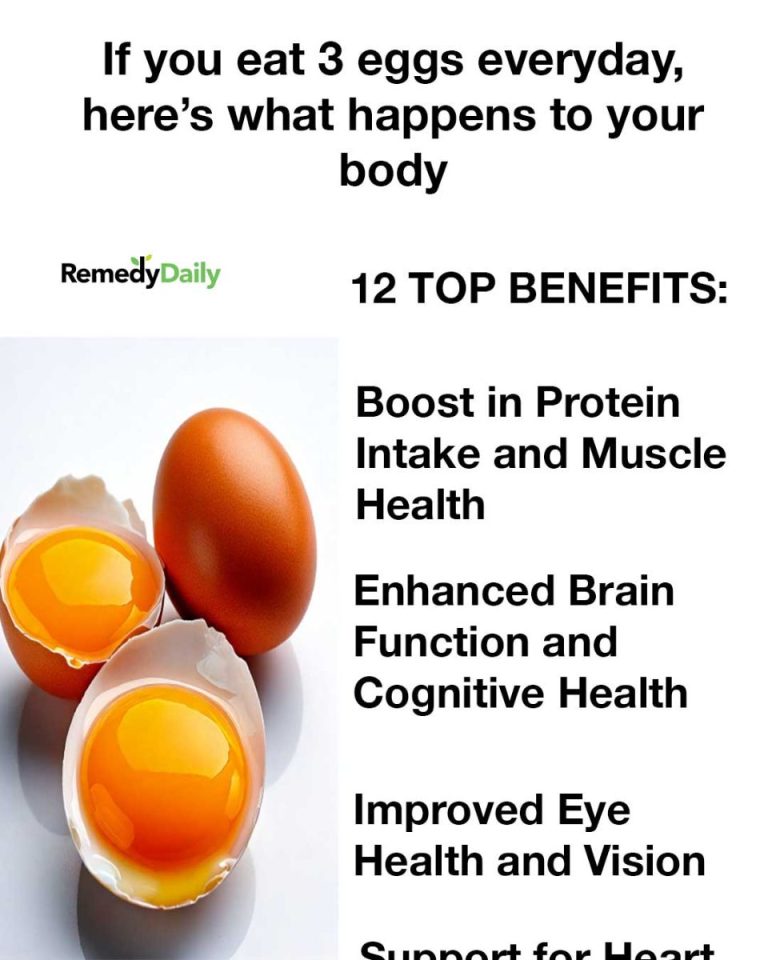ADVERTISEMENT
If you eat 3 eggs everyday, here’s what happens to your body

1. Boost in Protein Intake and Muscle Health
Eating three eggs a day significantly increases your protein intake, providing about 18 grams of high-quality protein. This is beneficial for muscle repair and growth, especially for athletes and those engaging in regular physical activity. The amino acid profile of eggs is ideal for supporting muscle protein synthesis, which is crucial for maintaining muscle mass as you age.
2. Enhanced Brain Function and Cognitive Health
Eggs are rich in choline, a nutrient that plays a critical role in brain function and development. Choline is a precursor to acetylcholine, a neurotransmitter involved in memory and learning. Consuming eggs regularly can support cognitive health, potentially reducing the risk of neurodegenerative diseases like Alzheimer's.
3. Improved Eye Health and Vision
Eggs contain lutein and zeaxanthin, antioxidants that are concentrated in the retina and protect against damage from ultraviolet light. These nutrients are associated with a lower risk of cataracts and age-related macular degeneration, the leading cause of blindness in older adults. Regular consumption of eggs can help maintain good vision and eye health.
4. Support for Heart Health
While eggs do contain cholesterol, recent research suggests that dietary cholesterol has a minimal impact on blood cholesterol levels for most people. Eggs also contain omega-3 fatty acids, which are known to support heart health by reducing triglyceride levels and lowering the risk of heart disease. However, individuals with specific health conditions should consult with a healthcare provider regarding egg consumption.
5. Contribution to Weight Management
Eggs are low in calories yet high in protein, making them a satisfying food that can help with weight management. The high protein content increases satiety, reducing overall calorie intake throughout the day. Starting your day with a protein-rich breakfast like eggs can help control hunger and support weight loss efforts.
6. Strengthened Immune System
Eggs are a good source of selenium and vitamin D, both of which are important for a healthy immune system. Selenium acts as an antioxidant, protecting cells from damage, while vitamin D plays a role in immune regulation. Consuming eggs regularly can help bolster your body's defenses against infections and illnesses.
7. Better Skin Health and Appearance
The vitamins and minerals in eggs, such as vitamin A, vitamin E, and biotin, contribute to healthy skin. These nutrients support skin cell regeneration and repair, helping to maintain a youthful appearance. Additionally, the antioxidants in eggs can protect the skin from oxidative stress and environmental damage.
8. Increased Energy Levels
Eggs provide a steady source of energy due to their balanced nutrient profile, including protein, fats, and essential vitamins. The B vitamins in eggs, particularly B12, are crucial for energy production and can help reduce feelings of fatigue. Incorporating eggs into your diet can help sustain energy levels throughout the day.
9. Support for Bone Health
Eggs are one of the few natural food sources of vitamin D, which is essential for calcium absorption and bone health. Adequate vitamin D levels help maintain bone density and reduce the risk of osteoporosis. Including eggs in your diet can support strong bones and overall skeletal health.
10. Regulation of Blood Sugar Levels
The protein and healthy fats in eggs can help stabilize blood sugar levels by slowing the absorption of glucose into the bloodstream. This can be particularly beneficial for individuals with insulin resistance or type 2 diabetes, as it helps prevent spikes and crashes in blood sugar levels.
11. Positive Impact on Mental Health
The nutrients in eggs, such as omega-3 fatty acids, vitamin D, and B vitamins, have been linked to improved mood and mental health. These nutrients play a role in neurotransmitter function and can help alleviate symptoms of depression and anxiety. Regular egg consumption may contribute to better mental well-being.
12. Contribution to Overall Longevity
The comprehensive nutrient profile of eggs supports various aspects of health, potentially contributing to increased longevity. By supporting heart health, brain function, and immune response, eggs can be part of a balanced diet that promotes a longer, healthier life. However, moderation and individual dietary needs should always be considered.